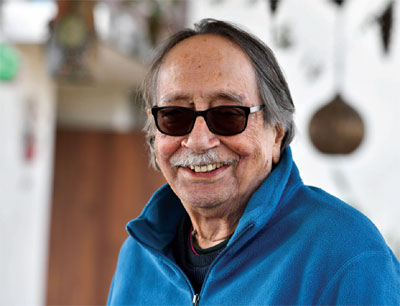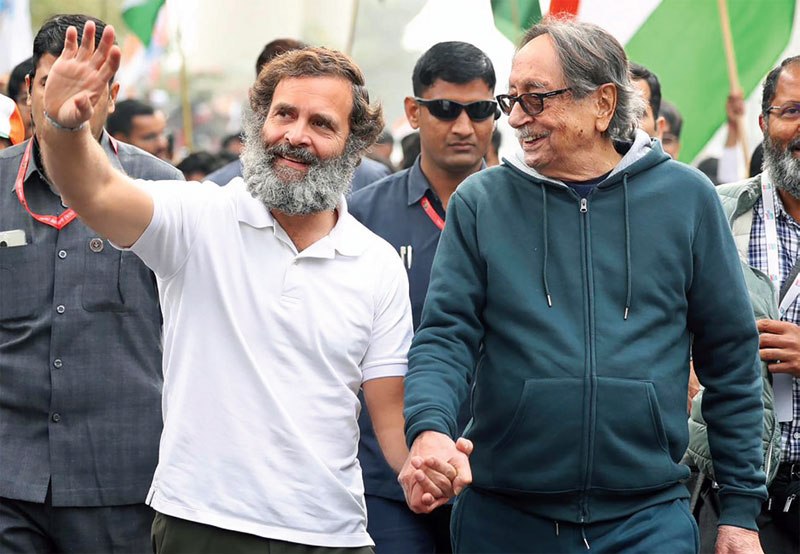Former R&AW chief A.S. Dulat’s memoirs, A Life in the Shadows, chronicles a life spent in pursuit of conversation
Smruti Deshpande
 Amarjeet Singh Dulat, the man whose name is associated with Kashmir even two decades after his retirement, joined the Bharat Jodo Yatra in Delhi in early January. He specially mentioned that he was invited to participate. He marched because, in his opinion, it was the right thing to do.
Amarjeet Singh Dulat, the man whose name is associated with Kashmir even two decades after his retirement, joined the Bharat Jodo Yatra in Delhi in early January. He specially mentioned that he was invited to participate. He marched because, in his opinion, it was the right thing to do.
Despite his calm demeanour, Dulat was excited to share his experience of the yatra. Calling it an ‘amazing experience’ he said there was no way he would have been able to catch a glimpse of Rahul Gandhi had it not been for an invitation. He is quick to point out that “If Modiji invites me to march with him, maybe I will march with him also. If somebody is doing something that he thinks is for the good of the country—doesn’t matter who—I will go.” His participation in the march came a little after the former spymaster released his memoir—A Life in the Shadows.
As Gandhi’s march was set to enter north India and reach Kashmir after a few days’ break post the Delhi leg of the yatra, Dulat was apprehensive of whether Gandhi would be able to reach Kashmir. But he is pleased that a mainstream politician from Delhi went to Kashmir. “When any political leader from Delhi goes to Kashmir, it gives Kashmiris hope. It also promotes the idea of India,” Dulat says. Every mention of Gandhi is followed by a quick mention of Prime Minister Narendra Modi. “If Modiji visits Kashmir that’s even better,” he says. Dulat tried hard to not reveal his political leanings. His views may appear obvious, but he doesn’t give it away easily while speaking, as though walking a tightrope.
All through the conversation, Dulat made no secret of his worries for the Kashmir Valley. In his opinion, visits by Indian politicians and bureaucrats to Kashmir are very few. He recalled former BJP minister Yashwant Sinha’s interest in Kashmir. “He is not a non-entity; he was in fact a big leader during Atalji’s time in the NDA government. He has served as our external affairs minister and finance minister,” Dulat mentions. “But” he adds, “when the government did not show any interest, there was little even Sinha could do.”
Owing to his decades’ worth of work in Kashmir, which earned him the tag of ‘Mr Kashmir,’ Dulat is confident that the Kashmir issue can be resolved. A year before Sinha quit the BJP, the former Union minister claimed that India had lost the Kashmir Valley emotionally. Dulat says he has been confronted with this question many times but would like to differ with Sinha. “We will never lose the Valley. The situation in Kashmir will never be irretrievable. But the longer we take to settle it, the more difficult we are making it for ourselves,” said Dulat.
He is of the view that Kashmiris sometimes exaggerate their suffering. In a chapter on Kashmir in his memoir, Dulat writes, “Kashmir has been ruled at various points by the Mughals, Afghans, Sikhs, Dogras and so on. There is, therefore, an exaggerated feeling of oppression. Can you call it victimhood? I certainly would. It is not easy to see instantly, of course. If you threaten him, a Kashmiri will lie down, he might even play dead.”
Dulat has no doubt that the Kashmiris have received the rough end of the stick and there was a need for reconciliation with the Kashmiris. “However, it is done, it should be done. Time will tell how we proceed,” he says.
Article 370, which granted special status to the state of Jammu and Kashmir, was abrogated in 2019 and the state divided into two Union Territories. Kashmir has been under Lt Governor’s rule ever since. Echoing the sentiment in Kashmir, Dulat said the abrogation was uncalled for and entirely unnecessary. Dulat visits Kashmir at least once a year and feels that there is a sense of alienation and hopelessness in the Valley. “I feel it was totally unnecessary as there was nothing left in Article 370. It was just a fig-leaf, but it gave the Kashmiris a sense of dignity. Article 370 disappeared in 1975 when Sheikh (Abdullah) Sahab signed an accord with Indira Gandhi,” he says.
However, “Now that it is gone, it is gone,” Dulat says. “The Kashmiri has by and large reconciled to this fact, and he knows it’s not going to come back. Anyway, over a period he has lost so much.”
Dulat feels there is an urgent need to revive the political and democratic process in Kashmir. The sooner elections are held, the better. He thinks an elected government would help the situation. He said more than anything else the Kashmiri leadership should be engaged regularly by New Delhi. The reason for the morose mood in the Kashmir Valley was because the people felt alienated.
“No interaction leads to frustration,” he says.
A keen observer of political developments in the valley, he says, “Whenever you hear Mehbooba (Mufti), she seems angry. Dr Farooq (Abdullah) and Omar (Abdullah) at times sound angry.”
Dulat has managed to maintain an independent view of the Kashmir problem. He admitted that Kashmir was the only thing he applied his mind to and would like to believe that he was a stakeholder. He believes that engagement with Kashmiris and erasing their alienation was the only answer. But, “fortunately or unfortunately” his views are known to the government and despite reaching out, the government has not entertained him for the past 10 months.
“There has been no response, which shows they obviously don’t need me,” he says. “I don’t feel that important either and I suffer from no illusions. The government’s views always have to have priority.” The 2019 developments have not dimmed his optimism on Kashmir even as he persists with his attempts at an audience with the government. “I would love to meet Modiji and if he were to give me 15 minutes, I would love to talk to him and give him my viewpoint. There are things that I think I am willing to share. But it does not have to be the ultimate truth,” he says.
Dulat also would like India to engage with Pakistan. He believes merely talking to the western neighbour makes the Kashmiris think there might be some end to their problems. In his view, there are not many Kashmiris who would want to be part of Pakistan. In fact, even among the radicals and extremists the number was dwindling. The reason for this, he believes, was India’s efforts to mainstream Kashmir and Kashmiris since 1947, which helped the locals shed Pakistan from their psyche. He said engaging with Pakistan was much easier than talking to China.
While all his appointments played an important role, Kashmir shaped Dulat’s career. Had he not gone to Kashmir, he would not have headed the R&AW and certainly wouldn’t have ended up in the PMO after his retirement from the agency to look after Kashmir. “Kashmir gave me everything,” he says candidly.
Asked if he ever felt insecure dealing with matters on Kashmir, he replied in the negative. However, the period 1988-1990 when he was posted in Valley was a “Terrible time. That time, we all felt insecure, but one was there, and one had to stay there and do one’s job,” he says.

Dulat is a very sought-after man. At the book launch in Delhi organised by the publisher Harper Collins, the who’s who of the media and politics turned up. His close friendship with Dr Farooq Abdullah is well known. In the memoir, Dulat has dedicated an entire chapter titled Doctor Sahib. The Jammu and Kashmir National Conference leader as well as Omar and Sara Abdullah were present at the book launch. Also present were former Vice President of India Hamid Ansari and Congress leader and former Madhya Pradesh chief minister Kamal Nath.
Speaking at the event, Farooq Abdullah warned of grave consequences if the situation in Kashmir was allowed to drift. He hoped that Modi would try to build bridges with Pakistan. Addressing the spymaster as ‘Bubbles,’ Abdullah said, “He has written a whole chapter on me, God, hasn’t he? I just thought, Farooq Abdullah, phansi ki taiyyari karo,” as the gathering burst into laughter. Kamal Nath said he was happy to see Dulat back among Congress leaders after veering into a different direction, referring to Dulat’s rather close association with the Vajpayee government. The event was moderated by Suhel Seth. Former intelligence officer Yashovardhan Azad read out a few passages from Dulat’s book. Prominent journalists including Suhasini Haider along with Nidhi Razdan were present. Congress spokesperson Shama Mohamed was also present at the launch.
Dulat’s book is deeply personal, just as a memoir is supposed to be. He suggests one should read the epilogue first—it could very well have been the introduction. Dulat does not shy away from expressing himself to a great extent in the book. The writer takes the reader on a journey to gradually unveil his life. From witnessing the horrors of Partition, fleeing Pakistan to return to east Punjab, experiencing the anti-Sikh violence and thinking of himself as a Sikh for the first time, to becoming the R&AW chief and to finally meeting the current prime minister at an event, Dulat tells it all in great detail. He does not shy away from expressing his opinion while countering someone else’s popular viewpoint. As much as he keeps himself at the centre of the narrative, he has given importance to personal and professional associations. He speaks at great length about Rajesh Pilot and Madhavrao Scindia among others. For Dulat, interpersonal relations have stood him in good stead. He attributes the word ‘friend’ to almost everyone.
The two chapters that catch one’s attention are on Kashmir and his friend, National Security Adviser Ajit Doval. Dulat applauds the NSA’s abilities as a spymaster while describing their long professional association. But he also reveals his difference of opinion with Doval on the handling of Kashmir. An advocate of engagement, Dulat says, “Our ways are different, but I think our aim is similar.” Their former boss M.K. Narayanan would say that if he had to wield a stick in Kashmir, he would send Doval and if he had to offer a carrot, he would send Dulat.
All in all, Dulat comes across as an amicable and a problem solver as far as Kashmir is concerned. In engaging with the militants as well as separatists in Kashmir and nurturing good relations with Pakistan, Dulat sends across a message that communication remains the key in solving the Kashmir issue even though it is his point of departure with Doval and the ruling regime.

